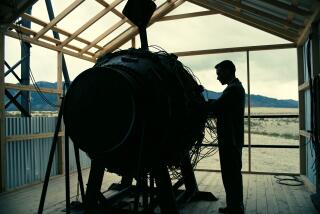Japanese Media’s Celebration of Hirohito Stirs Whispers of Dissent
- Share via
TOKYO — Not everybody in Japan loves the emperor.
As the 87-year-old sovereign Hirohito lies gravely ill in his palace, a tiny band of citizens flirts with lese majesty, marching around a park carrying signs denouncing the imperial system. Small groups of intellectuals conduct seminars to discuss his responsibility in World War II.
Some ordinary Japanese admit privately that they are irritated--even frightened--by the media’s uniform celebration of the man who was once the divine figurehead of Japanese militarism.
Public opinion surveys have shown that while 60% to 70% of Japan’s people support the system that retains the emperor as a symbolic head of state, 1 in every 10 Japanese opposes the Shintoist monarchy.
But to voice criticism at this time, when Japan is awash in a tide of sentimentality in what may be the emperor’s final hours, is to risk being branded as grossly insensitive or, worse, as “un-Japanese.”
Those few Japanese who confess a negative dimension to their soul-searching about the emperor say they feel that their right to self-expression has been restricted by the sacrosanct mood.
“I can think whatever I want,” said a woman in her 50s who harbors bitterness over wartime experiences as a child in Japanese-occupied Manchuria. “But now is not the time to say anything.”
Dissenting Views Surfacing
However, dissenting views are beginning to trickle to the surface as the nation continues its vigil over Hirohito, who fell seriously ill with what is reported to be cancer Sept. 19.
“We’re being manipulated by ‘emperor fever,’ and that’s dangerous,” said Daikichi Irokawa, a professor of modern history at Tokyo University.
Irokawa spoke to a gathering of about 60 publishing industry employees Thursday night and dissected what he said are contemporary myths being propagated by right-wing elements surrounding the emperor.
He contends that Hirohito’s image makers, in an insidious campaign, are portraying the emperor as the “savior of the country” for his role in breaking the deadlock over Japan’s decision to surrender to the United States in 1945.
“How can we give him credit for ending the war and completely forget his responsibility for starting it?” Irokawa said. “Japan lost 800,000 lives during the last week of fighting because authorities wanted to protect the emperor by avoiding unconditional surrender. If it weren’t for this concern, we wouldn’t have suffered the atomic bombings. . . . “
Moreover, the emperor is being lionized for traveling around Japan immediately after the war to encourage Japanese to rebuild their nation from the ruins of the American bombing, he said. But the real intention behind this unprecedented contact with his subjects, Irokawa said, was a public relations strategy to immunize Hirohito from strong sentiments among the Allied powers to put him on trial.
Indignation Over Articles
The Japanese government reacted with indignation last week when two British tabloids blasted the emperor as a war criminal. The vast majority of Japanese feel veneration for Hirohito as a father figure who embraces peace and provides a symbol of the country’s ancient history and culture.
But some people say the media’s intense scrutiny of his deteriorating condition is one-sided and largely irrelevant, focusing on such details as Hirohito’s blood pressure rather than seriously evaluating his role in history.
Viewers who telephoned broadcasting companies to complain about television coverage, which frequently interrupts programming on the Seoul Olympics to update the populace on Hirohito’s vital signs, have been rebuffed as “un-Japanese,” according to Yoshinori Yoshioka, a member of Parliament and of Japan’s Communist Party.
“This is a dangerous attitude that goes back to the prewar fascist era,” Yoshioka said. “If things are left like this, young Japanese who have no memory of the war can be manipulated very easily. We have to know our history to avoid being used again.”
Shinto ceremonies expected to be held after Hirohito’s death to enthrone his son, Crown Prince Akihito, raise questions about the constitutional separation of religion and state, according to protesters who marched in the Shibuya district this week. The group, which also carried out rallies during Hirohito’s birthday celebration in April, provocatively calls itself “Is Japan All Right This Way?”
More to Read
Sign up for Essential California
The most important California stories and recommendations in your inbox every morning.
You may occasionally receive promotional content from the Los Angeles Times.










